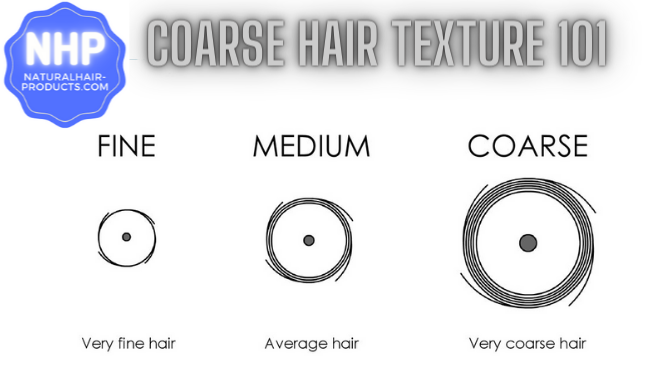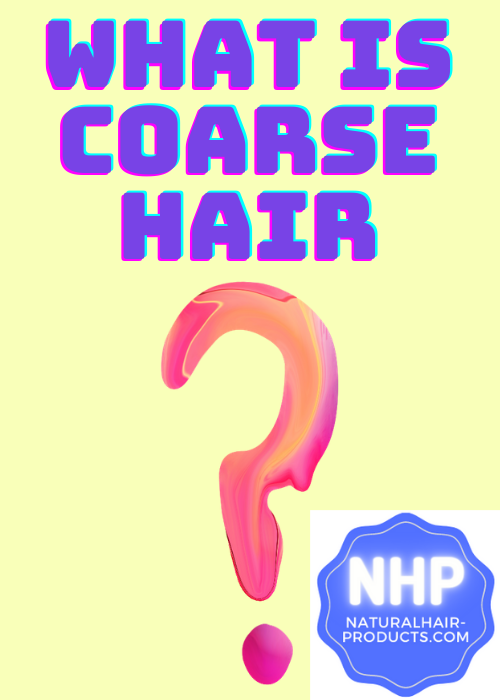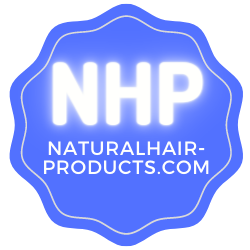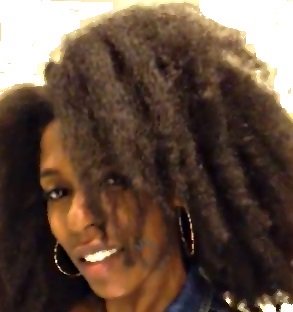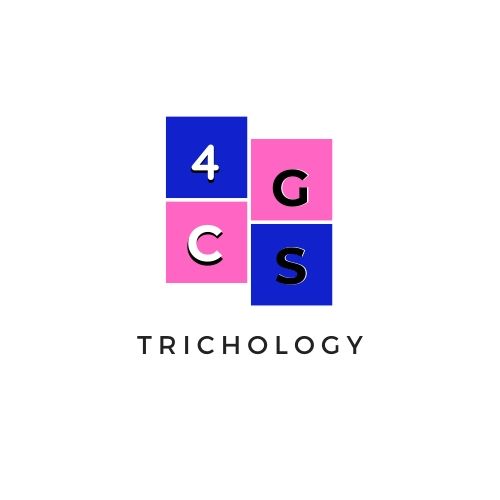Coarse Hair Care Tips [NHP 101]
- NHP
- Type 4C Hair 101
- Coarse Hair
Coarse hair is often confused with kinky hair, that’s not always true.
For as long as I can remember, we've heard terms like "difficult", “thick”, and "coarse" to describe ANY type 4 hair texture, which for many women can transmit negative emotions and cause them to perm relax their hair.
For many of us that have heard these adjectives, we need to recognize that these terms are repeated by those who aren't haircare professionals.
So while having what many would call "coarse hair" has its challenges—like combating dryness or spending hours detangling and drying natural curls—it’s important to actually understand what coarse hair really is.
Because some naturals think it means the difference between type 4, type 3 hair, natural wavy type 2 hair...Incorrect. Having 4C or 3C hair has nothing to do with it.
That’s what NHP is all about, accurate hair education. So let’s get into it!
What is Coarse Hair?
Simply put, coarse hair is the opposite of thin hair and can be identified by a thick hair shaft. This hair type has the widest and largest circumference of any other.
Think of a water hose versus a noodle. The water hose has a wider diameter, making it more coarse (or thick).
You may be surprised to know that coarse hair actually isn't a texture, even if it is related to texture.
To be technical about it, anyone from curly, to coiled kinky hair to straight and wavy could have coarse hair.
Unlike medium-thickness or thin hair, coarse hair contains all 3 layers of the hair shaft — cortex, cuticle, and medulla.
So it has nothing to do with whether you have 4B hair or 1B, coarse hair isn't about texture. so let's talk about softenting these thick strands...
What Softens Coarse Hair? [9-Steps]
Here are a few ways for how to make coarse hair soft and silky. Softening otherwise coarse hair can be treated with various home remedies. And all you really need is a combination of healthy hair care habits, hydration regimens and moisturizing products.
Consider the following coarse hair care strategies and steps you can implement into your routine.
[See my tutorial about the best edge control for coarse hair HERE]
1. Use a Weekly Hair Mask on Coarse Hair
Plant extracts and oils can be an effective way to add much-needed nutrient infusion and moisture protection to coarse hair. And, if you don’t have time for all of that and rather not fool around with pure oils, you can buy a ready-made hair mask instead.
Used every week, a penetrating hair health mask can help your tresses absorb moisture more effectively for softer hair over time, thick coarse hair that is softer is easier to manage.
To use a health-promoting hair mask just apply it to damp (not wet) hair after a cleansing shampoo session, then rinse out after five minutes. A popular option to try is Redken’s All Soft Mega Mask, see reviews and price here..
2. Use Bentonite Clay on Coarse Hair
Bentonite clay is a volcanically-derived substance that’s sometimes used for skin issues, like eczema, dryness, and bug bites.
Proponents believe that the clay can help effectively clean coarse hair while also balancing out your moisture levels. It’s also been known to fight against dandruff and scalp issues.
To use bentonite clay for your hair:
- Combine equal parts bentonite clay with vinegar or water, to form a thick hair paste.
- Apply your hair paste in the shower the same as you would apply a commercial brand hair mask.
3. Don’t Wash Coarse Hair with Hot Water
Avoid washing your coarse hair with hot water because it can more easily remove nutrients and cause your hair to dry out faster and give your tresses a dull look. Use lukewarm water for shampooing instead.
And it doesn't matter i you have high or low hair porosity.
You can also make your coarse hair feel softer and look shinier by rinsing your tresses with cool water when you’re done deep conditioning. This will help remove any excess product from your locks without stripping out moisture.
4. Wash Coarse Hair Strategically
If your coarse hair has dry ends and an oily scalp, you’ll need to get creative. To treat dryness and oiliness at the same time, try shampooing your scalp and then conditioning your ends only.
This can help remove both excess oils at your scalp and roots level while softening out the rest of your strands away from the scalp.
5. Use Argan Oil on Coarse Hair
Derived from Moroccan argan fruit extracts, argan oil for coarse hair oil is known for its moisture-guarding properties.
Fact is, natural hair product companies have added argan oil to numerous shampoos, conditioners, and scalp treatments, but extremely dry or coarse hair may benefit more from pure argan oil. (Grab some right here.)
As a bonus, you won’t have to bother with any harmul chemicals or unwanted additives with pure argan oil.
6. Use Coconut Oil on Coarse Hair
Coconut oil does its magic on coarse hair so well because it can penetrate deep into the hair shaft cuticles.
You can look for products already infused with coconut oil, or you can apply pure coconut oil to your hair after you do a thorough cleanse.
If your results end up feeling too oily, adjust your treatment method by concentrating on the ends of your hair exclusively. Buy a hair product with coconut oil now.
7. Use Olive Oil on Coarse Hair
Olive oil is well-studied for its effects on hair health, which also makes it great for coarse hair. It’s a common belief that olive oil can act as a barrier against water, which can help prevent water molecules from stretching and damaging the cuticle on coarse hair.
The bad part of applying this type of barrier is that it can also make your hair oily. For best results, only apply a small amount in a thin, even layer throughout the ends of your hair.
8. Slow Down With Overly-Frequent Treatments
As a fan of beauty tactics and treatments, there is the danger of doing too many. Whether it’s a hair dye color treatment, perm, or straightening/relaxer treatment, the results can be addictive. You may even be tempted to get another treatment after a few weeks.
And while professional hair treatments can often make your hair feel softer and appear shinier, many of these effects are very temporary. Why?
Because at the core of each treatment are harsh chemicals, which can dry out and damage your coarse hair with repeated use.
Your best bet is to lay off of the consecutive chemical hair treatments with a minimum of six weeks in between each session.
9. Go Easy With Heated Tools on Coarse Hair
Without a doubt, flat iron hair straighteners, blow dryers, and curling irons, are staples for many natural hairstyles.
However, prolonged and/or excessively high heat can create damage pockets (or bubbles) in your hair cuticle which can quickly lead to breakage. If you decide use heated tools, following these important guideline tips:
- Apply a thermal serum heat protectant product before each heat application.
- Use the lowest heat setting possible for your hair type.
- Never use heat tools on wet hair — let your hair air dry, or towel dry first.
- Take weekly heat breaks to allow your hair to recover.
Coarse Hair FAQS:
Can coarse hair be straight? Yes, straight hair can also be defined as coarse because coarseness refers to the diameter thickness of the hair strands. If you have coarse hair, it will probably have more natural body than thin, fine hair strands. It may feel rough in texture, and it may feel like you have a lot of it. Coarse hair can be straight, as in many Asian hair types, or curly or frizzy, as in some kinky-haired naturals.
Why is my hair wiry and coarse? Some people are born with wiry, coarse hair. Others may have caused their hair to become wiry and coarse through chemical altering or damage, heat styling, and overuse of hair products. When hair is dry and wiry, it may become brittle, dull, and frizzy. If this is the case with your hair, it’ll help to wash and deep condition your hair using products designed for dry, damaged hair.
How do you know if you have coarse hair? If you can barely see individual hair strands or feel it between your fingertips, then you have fine hair which is the opposite of coarse. If your hair strand looks thick and appears to have more volume, then the hair is coarse. If your hair is somewhere in-between, then you have moderate or medium-width strand thickness.
10 Good Coarse Hair Products
- Here are a few of the best coarse hair products for your precious follicles to look into for hair health & easier styling.
- R+Co Atlantis Moisturizing B5 Conditioner
- Creme of Nature 100% Argan Oil
- L'Occitane Intensive Repair Conditioner
- TGIN Butter Cream Daily Moisturizer
- CHI Rosehip Oil Protecting Shampoo
- African Pride Shea Butter Miracle Silky Hair Moisturizer
- Alikay Naturals Moisture Rich Parfait
- Aphogee Balancing Moisturizer
- CHI Argan Oil plus Luxe Trio Kit - Shampoo, Conditioner & Moringa Oil
- Miss Jessie's Leave-In Condish
I hope you found the coarse hair info that you needed, if you have different hair type questions or concerns, check out the additional NHP tutorials we have ready for you.
Enjoyed Coarse Hair Tutorial?
TAKE 4C HAIR SURVEY...
We have specialized 4C hair help, advanced tips for coarse natural hair, moisturization secrets and more.
Grab NHP's tips sent straight to you and learn about your hair and get smart new ways to get your hair looking and feeling amazing!! Get your 4C hair tips here...
